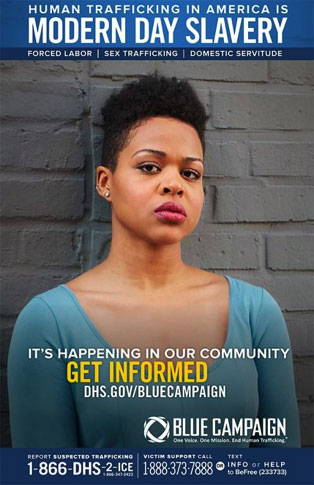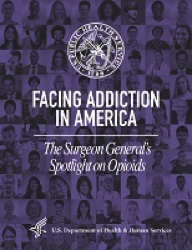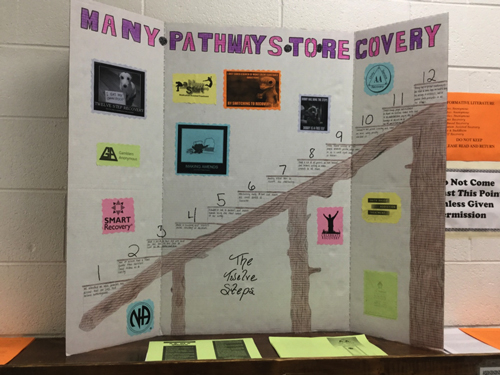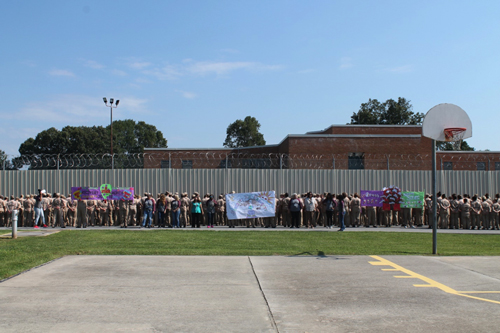January was Human Trafficking Awareness Month | Four Legged-Friends Provide Therapy | Recovery Month in the State of Georgia | Outside Spectrum | Spectrum Girls’ Detention Program Wins Statewide Decorating Contest | 17 Spectrum Employees Are Inducted into the President’s Club This Quarter | Spectrum Receives $10,000 grant | You May Want to Check Out | MA Department of Correction Hosts Female Treatment Thought Leader Meeting | MADOC Expands Spectrum’s Contract
January was Human Trafficking Awareness Month

“Victims of human trafficking can be any age, gender, race, or immigration status; they live in cities, suburbs, and rural areas. Human traffickers relentlessly canvass ways to take advantage of people who find themselves in circumstances of extreme adversity or violence, experience discrimination, economic vulnerability, or dependence. Communities that experience some of these hardships may be particularly vulnerable to human trafficking.
This summer the Blue Campaign introduced a new phase of its national campaign to raise awareness of the full reach of this crime and promote new and innovative web-based educational resources to reach all communities across the U.S.”
Included is a sample of their poster campaign which began in the summer.
Four Legged-Friends Provide Therapy Augmentation to Spectrum’s Residential Clients

Paws for People (PFP) is a non-profit organization in New England which is affiliated with the Tufts Veterinary Program and supported by the Center for Animals and Public Policy. The current program has its roots in a small animal visiting program that began in 1998. The program as it is known today launched in 2004; today, PFP has 100 animal/handler teams who visit various programs and facilities with regularity to provide therapeutic benefits to people in a number of settings, including, but not limited to: elder care facilities, hospice centers, mental health facilities, hospitals, public schools, libraries and substance use treatment disorder programs, among others.
The New England Recovery Center began PFP visits in November of 2018. It will come as no surprise to animal lovers, that interacting with animals promotes the release of serotonin, prolactin, and oxytocin – all of which contribute to an elevated mood. The physical and mental health benefits of interacting with fuzzy friends are many, and include:
• Lowered blood pressure and improved cardiovascular health
• Reduced anxiety
• Pain diminishment and often, increased motivation
• Reduced loneliness
• Greater happiness and relaxation
• Non-threatening way to engage/interact
• Increased mental stimulation
The program has been embraced by one and all, but the clients, in particular, love receiving weekly and sometimes biweekly visits from two wonderful dogs – one, a Newfoundland named Harbor Grace who is a mellow 8-year old, and the other, a pit-bull mix named Felicia. Right now, they are being used in group sessions, but the success of this program may encourage further expansion to other areas at the Faris Center. Thanks to Cheryl Bedard, Regional Business Development Liaison, who has been advocating for this program for some time.
Recovery Month in the State of Georgia – September 2018
Each September, the U.S. Substance Abuse and Mental Health Services Administration (SAMHSA) sponsors Recovery Month, with the goal of increasing national awareness of mental health and substance use disorders while simultaneously celebrating people who are actively in recovery. The agency manages a calendar of events and provides a platform to individuals and agencies to share their personal stories. The SAMHSA site also posts public service announcements.
Our programs were, as always, very active throughout the month. Each year staff and clients alike find new and different ways to educate and celebrate. Sabrina Hudnall, the State Director for Georgia’s Correctional Programs is incredibly proud of the work of her staff and their clients in this regard. She sent us a sampling of pictures to share across Spectrum.
In Georgia, Spectrum operates 14 RSATs. Pictured below are several programs participating in a range of celebrations.
|
|
|
|
Recovery Balloon Release at the Bainbridge |
Display Board at Northwest Residential Substance |
|
|
|
|
Art Contest at Pulaski State Prison |
Lee Arrendale State Prison Dorm Banners |
Our Georgia-based programs also put on skits, hosted guest recovery speakers, held poetry and poster contests, wore ribbons, designed and wore recovery t-shirts, watched recovery documentaries, and held a walk around the unit yard as well as an iron man challenge (field event). They made affirmations, undertook role plays and held a cake decorating contest. Thanks to Georgia for going all out. No surprises there!
OUTSIDE SPECTRUM
On the Fly with Mark Brown, Executive Director of Adolescent Services and Peer Recovery Centers
What does Mark Brown, share with 38 million other Americans? We know he coaches youth sports, and we’ve seen him on that pontoon boat. Maybe we’ve even been four wheeling with him.
Here is a hint. Neurobiologists say it is good for you. Many claim it is relaxing. Okay – here is the dead giveaway – it is done mostly on cold-water rivers, streams, lakes, and ponds which are West of the Mississippi River. You’ve guessed it – fly fishing!
Mark Brown sat down with us to answer questions about the nearly life-long hobby.
How did you start fly-fishing, Mark?
I started fly-fishing with encouragement from my buddy, Tom, almost twenty-five years ago. We were bass fishing on his boat with spin rods and he challenged me to try a river with him. I can never resist a challenge, and so it began!
What is your go-to fly rod?
I favor Orvis over all other equipment. You don’t have to get new equipment, though. You can pick great stuff up at yard sales and flea markets. A typical fly rod is about 9.5 feet.
When is the best time to fly fish?
While fish are hungry at sunrise, the best to time to fish is during a hatch.
It is easy to do?
Quite the contrary. It involves a lot of skill and it is helpful if you have someone show you the ropes. This is not stuff you can really learn by reading a book or a manual. It takes a lot of time and lot of practice. And, surprisingly, it is not really about catching the fish:

What?
It’s not, although I do, of course. It is really more about getting away from it all and surrounding yourself with nature. I tend to fish for several days at a time about twelve times a year. It’s a solitary sport, but I always bring buddies or family – we just fish far apart and meet up for meals. We’ve seen moose, black bear, and fisher and bob cats. If we catch something – great – we have trout for dinner!
What is the dumbest thing you’ve ever done on a river?
My brother and I were fishing on the First Connecticut River some time ago. Up ahead, I spotted what I thought was the ideal fishing hole. I forged on ahead, not realizing how deep the river was. Suffice it to say, I needed help getting out of the river!
What are the favorite rivers you’ve fished?
Hands down – The First Connecticut River in New Hampshire at the Canadian border. I also like the Pulaski River in Saratoga, NY.
And what River is on your bucket list?
I want to get to Alaska!
Spectrum Girls’ Detention Program Wins Statewide Decorating Contest
Each year the Massachusetts Department of Youth Services holds a Holiday Decorating Contest throughout its programs across the Commonwealth. This year, Nadine Adams, the Spectrum Girls’ Program Director in Westborough is pleased to report that her program won (for the second time) – hands down! Now we all get a chance to see why. All staff and program participated to bring their Dr. Seuss Whoville theme to fruition. As the program has strong connections to the community, staff were able to obtain many of the materials through visits to area stores. The program will be honored with a luncheon and a trophy later this month for their creativity.

17 Spectrum Employees Are Inducted into the President’s Club This Quarter
Spectrum President & CEO Kurt Isaacson sends a very special congratulations to the new members of Spectrum’s President’s Club. The President’s Club recognizes exceptional contributions by individuals across the company who exemplify Spectrum’s mission and values. Individuals are nominated year-round by other employees; nominations are reviewed and accepted annually.
Inpatient
- Juanita Burgos
Mass DOC
- Sarah Larsen
- Bernice Richard
Home Office
- Nathan Howe
- Theresa Caron
- Lorie Rosen
- David Booth
Outpatient
- Betty Tran
- Jennifer Ljungquist
- Sanjay Grant
- Laurie Marcheterre
- Michelle Graham
- Paola Medrano-Bueno
- Jasmine Barnwell
Out-of-State DOC
- Sherdal Lewis
- Sabrina Hundall
- Tricia White
Spectrum Receives $10,000 grant from the Reliant Foundation to start Transitional Housing Fund for Clients Leaving our Long-Term Residential Programs
As we all know, residential treatment involves an incredible level of commitment from our clients. They must devote every waking minute to their recovery. Clients participate in groups and do hours of individual therapeutic work. They are in a secure environment which does not allow for them to work and they are with us, often for 60 to 90 days. And, then, suddenly they return to the community – often without the financial resources to get started in securing housing and employment.
Sober housing stability is critical to maintaining sobriety in the early days of recovery work, when people are at the most risk for overdose. “We’ve aligned ourselves with lots of great certified residences which are willing to work with our clients upon discharge,” said Sharon Ploss, the Program Director at the Charles J. Faris Center. The barrier is that many of our clients do not have the money for the upfront costs of a first month’s rent and security deposit. “We are so grateful that the Reliant Foundation was able to step in and give our clients the best possible chance of success,” said Ani Rengifo, Director of Clinical Services.”
This project is well underway. Once a client applies for and is approved for the first month’s sober housing rent (and/or security deposit), Spectrum pays the sober house directly with money from the Reliant Foundation grant.
YOU MAY WANT TO CHECK OUT:
The Surgeon General’s Spotlight on Opioids (September 2018)

Rent this on Netflix: Heroin(e)

MA Department of Correction Hosts Female Treatment Thought Leader Meeting
The Massachusetts Department of Correction (MADOC) hosted a Thought Leader Meeting on November 26, 2018 to bring together research and practice experts in the field of Women’s Behavioral Health Treatment. The purpose of the meeting was to examine the latest research in the field of Trauma-Informed care and assess MADOC’s practices in delivering treatment to the female offender population. Dr. Roger Peters from the University of Southern Florida, and expert in Co-Occurring Disorders and Dr. Nena Messena from UCLA, a leading researcher on women’s behavioral health treatment, presented the latest research in their respective fields. The take-away from both researchers is that MADOC is well ahead of the field in providing gender-responsive and trauma-informed care to female offenders in Massachusetts.
The meeting was attended by ADC Erin Gaffney, Superintendent Alison Hallett, Deputy Superintendent Kyle Pelletier, Director Program Services Jaileen Hopkins, Senior Vice President Correctional Services Christopher Petrozzi, State Director Earl Warren, Regional Director Jennifer Zachary, and several practitioners from MADOC’s behavioral health division. Subsequent Thought Leader Meetings will focus on program and treatment delivery enhancements to continuously improve service to female offenders.
MADOC Expands Spectrum’s Contract
Starting in January 2019, MADOC is expanding offender treatment in response to Criminal Justice Reform legislation signed earlier this year. Spectrum will operate three Secure Adjustment Units at MCI Cedar Junction, MCI Norfolk, and Souza-Baranowski Correctional Center. These units will provide up to 90 days of Cognitive Behavioral Therapy (CBT) treatment designed to provide behavioral management and coping skills to those offenders releasing from restrictive housing prior to returning to general population. Additionally, Spectrum will be providing CBT treatment programs to offenders who are in restrictive housing for more than 60 days at five institutions around the state. The programming will be delivered using tablets that will be issued to each offender. Staff will monitor offender progress in the program and provide support to the offenders.
The expansion provides and additional $1.33M and 24 additional full-time staff.






